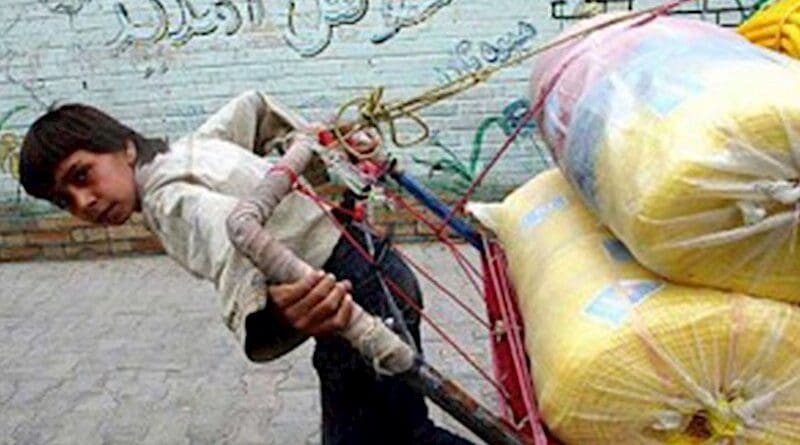Iran: The Catastrophic Situation Of Child Labor – OpEd
By Mahin Horri
The alarming state of child labor in Iran is deeply affecting the physical and mental well-being of the country’s children.
After the seizure of the Iranian people’s right to govern, Ruhollah Khomeini and his plundering and exploitative successors intensified oppression and injustice against impoverished and destitute families. The overwhelming poverty and misery were such that fathers had to work double shifts to meet the minimum essential needs of their families, yet they still could not cover the exorbitant costs and crippling inflation. Mothers headed to workshops and service centers or prepared food for sale in public places, but they too failed to earn enough for the necessities of life. It was at this point that young children, boys and girl, said goodbye to their studies and schools to help support the family’s livelihood, heading to underground workshops, brick kilns, street vending, car washing, and garbage collecting. They are forced to undertake tasks to earn a morsel of bread or buy medicine for their parents, effectively becoming small-bodied slaves.
Child laborers in Iran often live in unfavorable and dangerous conditions, which can have long-term negative impacts on their physical and mental health. Child laborers are frequently exposed to physical hazards such as work-related injuries, diseases, and malnutrition. Stress, depression, and other psychological problems are also among the consequences of child labor. Child labor usually deprives them of education, which can seriously affect their future. Additionally, these children are more vulnerable to social dangers such as abuse, violence, and exploitation.
The mullahs’ regime in Iran has deliberately prevented any scientific and expert investigation into this disaster, and the lack of statistics and information about child laborers is one of the main challenges in addressing this phenomenon.
On June 13, Ebtakar newspaper wrote, “There is no accurate estimate of the number of child laborers in Iran, as official statistics are not fully and accurately recorded. Child laborers usually work in streets, underground workshops, and informal work environments. Many of them are forced to work due to their families’ economic problems, lack of access to education, and unsuitable social conditions. Common jobs for these children include street vending, garbage collecting, working on farms, and in production workshops, often under harsh and dangerous conditions.”
The Clerical Regime’s Concealment in Broad Daylight
On June 10, the official ILNA news agency quoted Saeed Moidfar, the head of the Iranian Sociological Association, as saying, “The existence of issues like street children indicates the presence of a disease in society that has its roots. One solution is to address the surface and appearance of it, for example, by implementing collection plans and removing the affected individuals from society so that no one notices them. For decades, we have been dealing with social phenomena with this same strategy, and none of them have ever worked. In the field of reducing social harms, we have not been able to take a single step forward. Our approach has not been causal, expert, and scientific; it has been coercive.”
According to the regime’s laws, individuals under 18 years old are considered children and adolescents and should not work.
On June 13, the state-run Shargh newspaper quoted Reza Shafakhah, a social worker and lawyer, as saying, “We have 19 million marginalized people and three million child laborers in the country. Ordinary work for children under 15 is illegal, and hard and hazardous work is a crime.”
The Final Battle of the Small Slaves is Approaching
The small slaves who suffer double the hardship in the arena of life constantly witness various traumas, including sexual abuse, physical abuse, emotional abuse, and physical and emotional neglect, the loss of parents, and a thousand other pains and hardships. The solution to this catastrophe is none other than for the people of Iran and their resistance movement to uproot the mullahs’ regime and establish and free and democratic republic.

